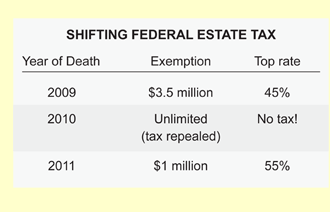These pitfalls arise from two rule changes:
Estate tax. The chart below shows the nonsensical shifting exemption amounts and tax rates from last year to next year.

Under current law, if you die in 2010, you pay no federal estate tax at all, even
if your net worth is in the billions. But if you die in 2011 with more than $1 million
in your estate (including life insurance benefits), you could pay federal estate tax, with a top rate rate of 55%. It’s therefore much more advantageous to your heirs if you die in 2010 (prompting one columnist to dub the enacting legislation the “Throw Momma from the Train Act.”)
Conventional wisdom was that Congress would pass legislation to avoid such a mess,
perhaps by fixing the exemption and rates at 2009 levels. They didn’t, and there is no
assurance that they will make any changes.
This kind of uncertainty plays havoc with the ability to plan your estate.
Capital gains tax. The next change affects capital gains tax, which must be paid on the sale of appreciated assets such as real estate, stocks, mutual funds, and so on. It is a tax on the difference between the “basis” (the purchase price with certain adjustments) and the eventual sales price. For years, the law has provided a stepup
in basis as of a person’s date of death. That means, for example, that the heirs of a person who died in 2009 owning stock worth $200,000 will have a basis of $200,000, even if the owner bought it for $40,000 years ago. If the estate sold it for $200,000, no capital gains tax would have been owed.
In 2010, the rules change. There is no automatic step-up in basis. Instead, there are provisions to allocate up to $1.3 million in basis step-up among the estate’s assets, and an additional $3 million step-up for property left to a surviving spouse. But both of these provisions are conditional, and depend on how the property is titled or left to a beneficiary.
For those who die in 2010, problems that could arise include:
- family members will fight over how the basis is allocated, because that allocation could affect heirs in unequal amounts
- the property may not be titled or bequeathed properly to allow heirs to take advantage of the step-up provisions
- there can be a record-keeping nightmare in trying to prove the basis of property purchased decades ago; if undocumented, the basis is presumed to be zero and tax will be based on the entire sales price
Confusing matters even further, these capital gains rules are set to expire at the end of 2010, so that next year there will once again be a full step-up in basis as of date of death.
Possible Congressional action
Rumors abound about whether Congress will act to fix this conundrum. Some commentators believe Congress may enact legislation to make the rules more uniform from year to year, and make it retroactive to January 1 of this year. Congress could also make changes, and give taxpayers a choice of using those new rules, or the rules currently in effect, whichever is more advantageous.
Then again, Congress could do what it’s done about this situation for the past eight years: nothing. Safe to say, no one knows for sure what the government will do.
Bottom line
For someone who dies in 2010, there is currently no federal estate tax, but there may be capital gains problems that were not anticipated previously. If the same person were to die in 2011, the capital gains picture improves, but federal estate tax rates will be higher and the exemption lower than it has been for years.
For someone who might die in 2010 (in hospice, seriously ill, etc.), it could be critical to redo the estate plan to allow for these changes.
What you can do
Here are some steps you can take:
1. Read more about it on our website. We have posted more detailed information so that you can learn more about how these changes may affect you. Pay particular attention to the section on who is most likely to need help now.
2. If you believe you, or someone in your family, may be affected by these changes, call our office to schedule an appointment. We can help you craft a strategy that fits your circumstances.




